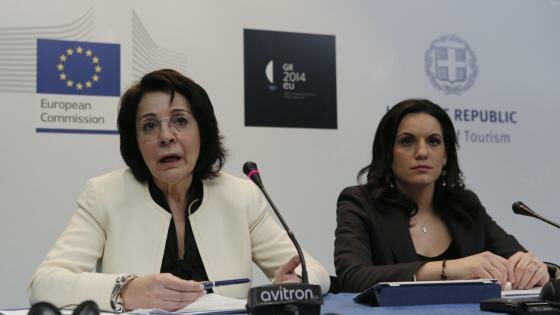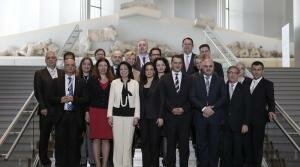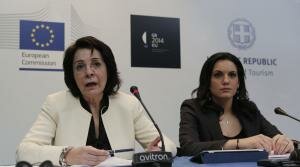- COMPETCompetitiveness (COMPET)
Coastal and Maritime Tourism can contribute to growth and the creation of job opportunities
In the opening session of the High Level Conference on Coastal and Maritime Tourism that was held today (10.3.2014) at the Acropolis Museum, in the framework of the Informal Meeting of Ministers for Tourism, Greece’s Minister of Tourism, Olga Kefalogianni, referred to the challenges and opportunities arising from “Coastal and Maritime Tourism” for the EU countries.
Upon arrival at the Acropolis Museum, the Minister of Tourism, Olga Kefalogianni, made the following statement: “Tourism is a sector of special interest for the European Union (EU). The High Level Conference on coastal and maritime policy of the EU is taking place today in Athens, in cooperation with the European Commission. The maritime policy is a horizontal policy of the Greek Presidency of the Council of the EU. Both Greece and Europe foresee that tourism could contribute significantly to economic growth. This sector accounts for 10% of the EU GDP and employs 20 million people. As a rapidly developing sector, tourism could play an even more important role in the following years towards the economic growth of the EU as well as the creation of job opportunities. The Greek Presidency promotes those policies that give Europe, the world’s top tourist destination, the opportunity to maintain its position by enhancing the existing policies through the generation of new job opportunities and income”.
During the High Level Conference on Coastal and Maritime Tourism, that was organised by the Ministry of Tourism of Greece, in cooperation with the European Commission, major topics regarding the growth of the tourism sector as a top priority of the Greek Presidency of the EU Council were discussed. Among others, there was a discussion over the growing dynamics of the sector, its economic and social benefits, its contribution to the enhancement of regions and local economies, its potential contribution to a decrease in unemployment. There were also references on the initiatives that should be taken in order to facilitate the implementation of policies which will result in the rapid growth of direct and indirect activities related to the coastal and maritime tourism.
The Conference was a platform for the exchange of opinions and best practices concerning coastal tourism, cruise tourism, yachting, coastal management, maritime clusters, maritime cultural heritage and cooperation between the public and private sector in order to promote the sustainable maritime and coastal tourism in the EU in a period of intense competition from other countries.
It should be underlined that the EU, according to the Communication “European Strategy for more Growth and Jobs in Coastal and Maritime Tourism” of the European Commission, aims at the enhancement of the coastal and maritime tourism in Europe, acknowledging the potential for growth and for the generation of new job opportunities in the sector. This specific strategy outlines EU initiatives to help the coastal regions and enterprises to tackle issues related to knowledge, unstable demand, high seasonality, lack of suitable skills and innovations and difficulties of access to funding.
The 10 actions that have been proposed in this context include:
• creating a guide on the internet for funding opportunities, especially for SMEs;
• promoting dialogue at a European level with cruise ship operators, port authorities and other stakeholders;
• highlighting the maritime dimension in tourism initiatives of the EU;
• supporting transnational and interregional cooperation as well as specific strategies;
• developing innovative management solutions using ICT;
• improving data collection relating to coastal and maritime tourism; promoting ecotourism and creating sustainable action networks;
• developing strategies aiming at fighting pollution and waste;
• launching research to improve connectivity between islands and create tailor-made strategies;
• conducting research for innovative practices which could contribute to the development of marinas.
There is a growing interest expressed by the European Commission in the sector of coastal and maritime tourism aiming at making Europe the world’s top tourism destination, developing a new European framework of tourism policy and promoting a responsible and sustainable tourism. The Informal Meeting of Ministers for Tourism focused on these issues giving also emphasis on the matter of accessibility in tourism. The events of the Ministry of Tourism were described both by the European and Greek officials as of great importance for promoting continuous growth, qualitative upgrading and sustainability of European tourism.










